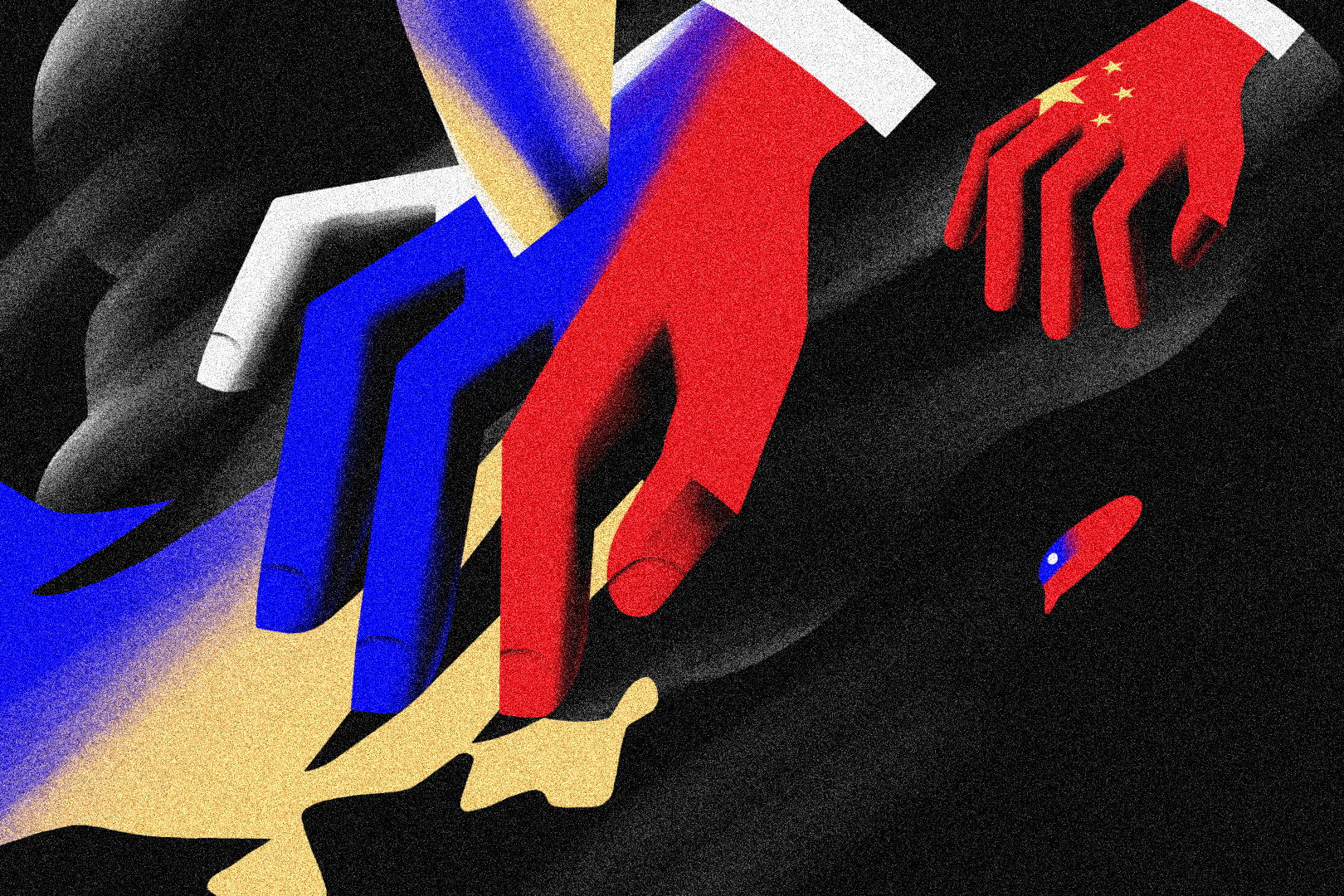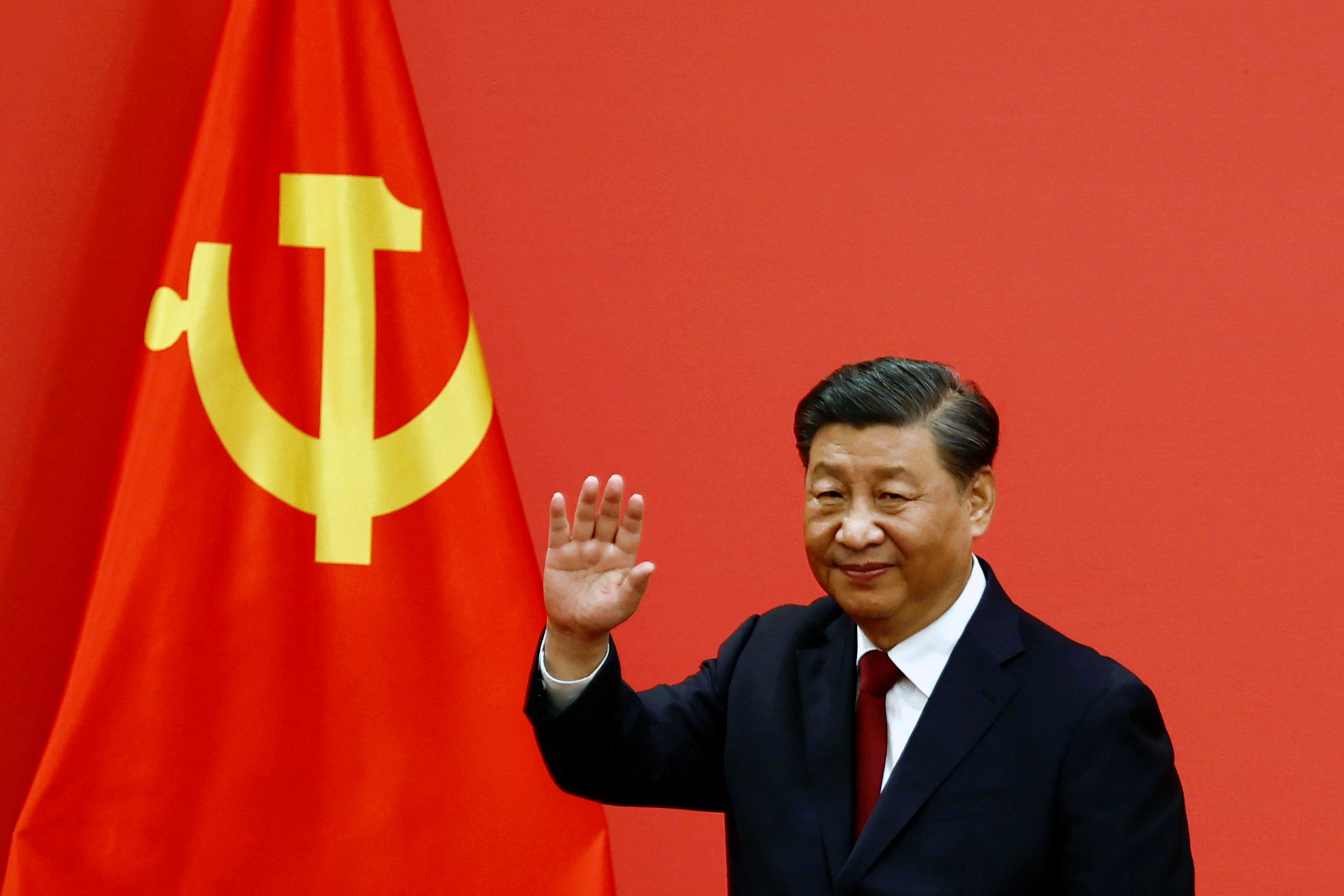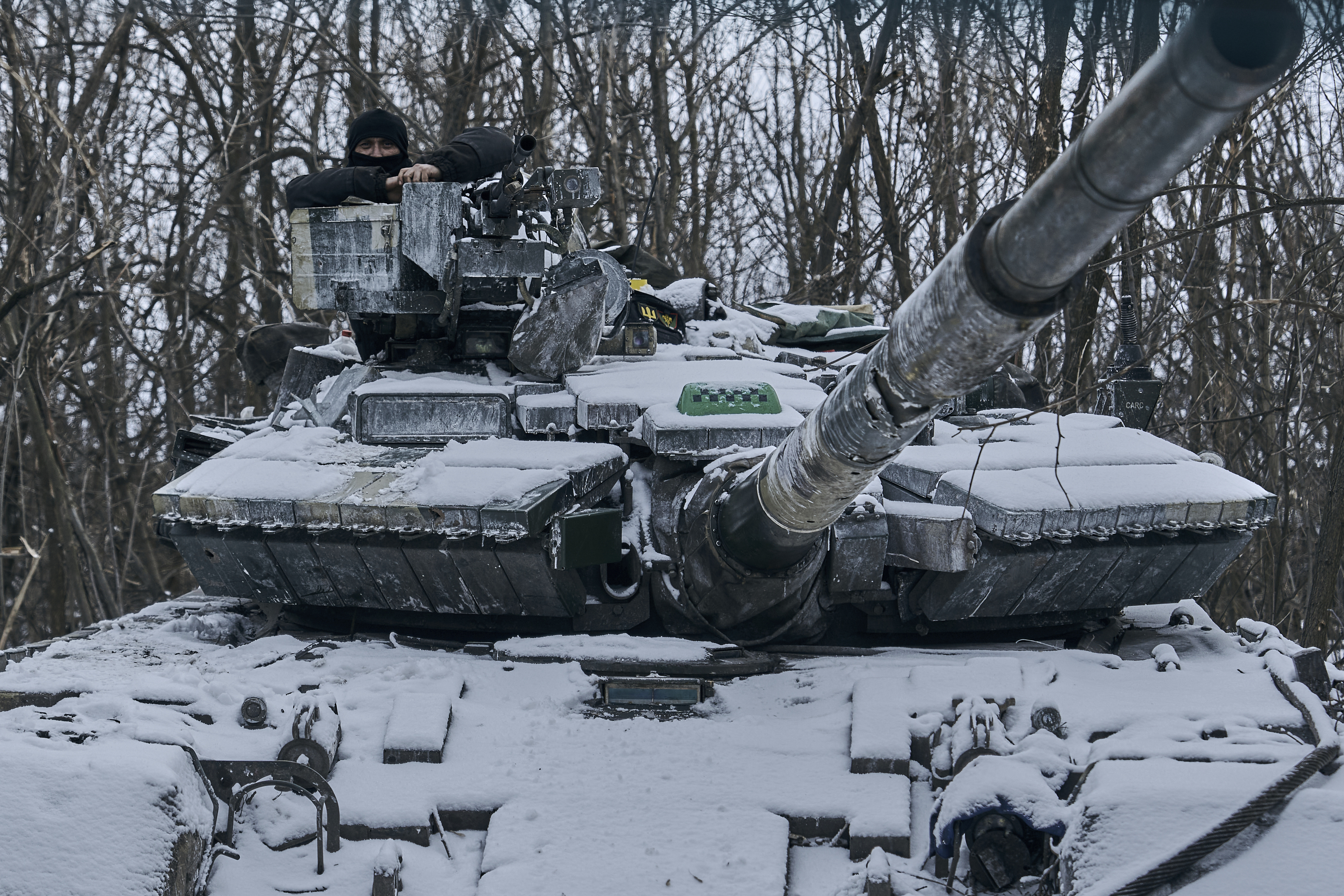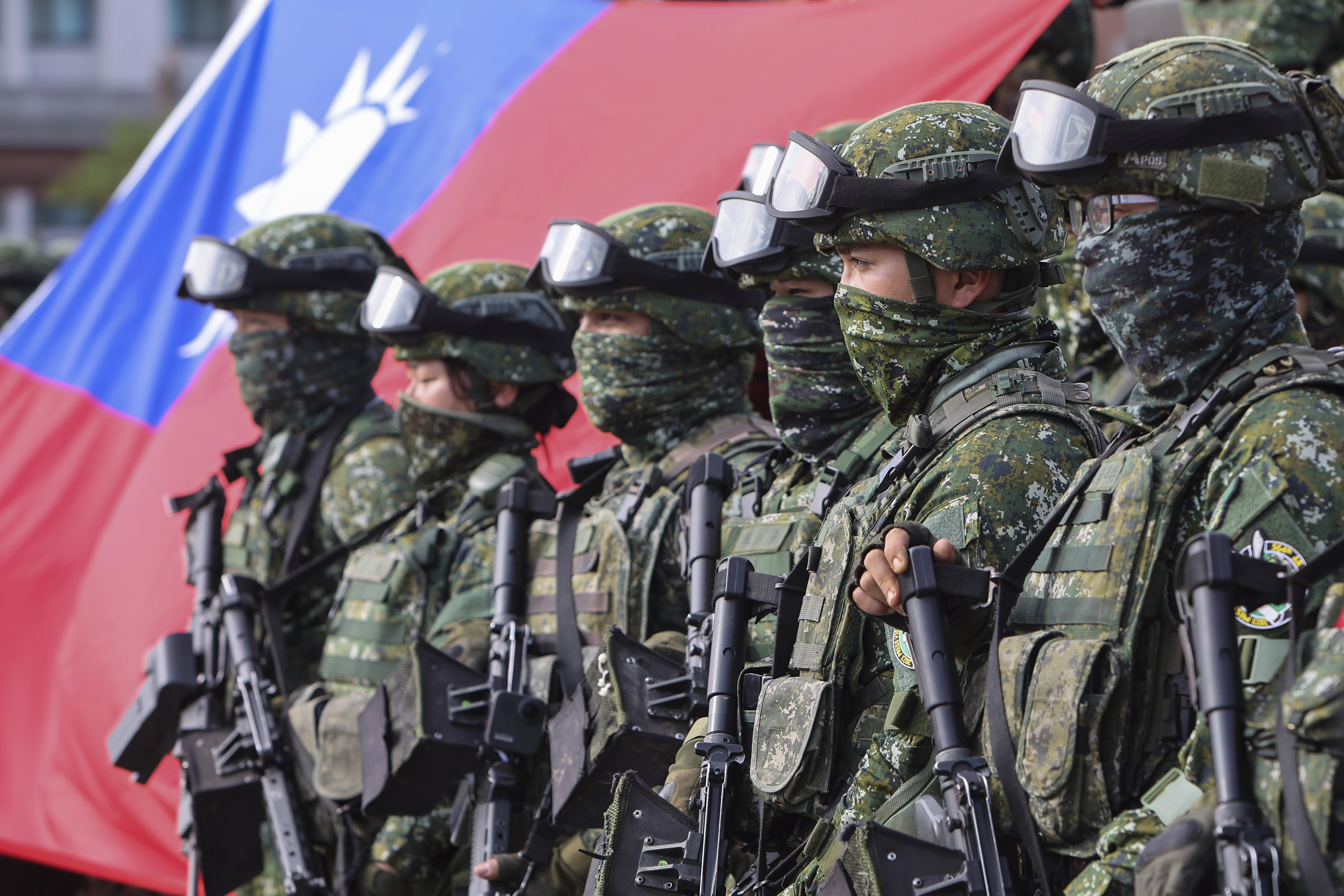
In the lead-up to Russia’s invasion of Ukraine in February 2022, Beijing and Moscow doubled down on their close relationship.
While Chinese President Xi Jinping and his Russian counterpart Vladimir Putin have a long history of working together, they publicly cemented their ties with a “no-limits” partnership just weeks before the war began.
The timing of the meeting and the subsequent invasion, after the Beijing Winter Olympics had concluded, led many observers to wonder whether Xi knew the war was coming. They also wondered, as Russian troops rolled into Ukraine, whether Taiwan was next.
Superficially at least, Ukraine and Taiwan appear to have much in common. Both are democracies whose territories have historically been claimed by much larger and better-armed neighbours. Beijing has long pledged to “reunify” with Taiwan by force or by peace by 2049, the year the Chinese Communist Party has set for the “great rejuvenation of the Chinese nation”, 100 years after their victory in the country’s Civil War.
Tensions across the Taiwan Strait rose further last August as Nancy Pelosi, then the United States House of Representatives speaker, became the highest-ranking US official to visit Taipei in 25 years. China responded with a series of war exercises around Taiwan and ramped up its rhetoric. In 2022, Beijing sent a record 1,737 flights into Taiwan’s Air Defence Identification Zone, which includes the airspace around Taiwan and the coast of China, according to data compiled by Gerald C Brown and Ben Lewis, independent defence analysts who track such incursions. This was more than the combined numbers for the previous four years.
Now, on the eve of the anniversary of the invasion of Ukraine, Russia’s struggles to make advances in the war have once again given rise to questions about what lessons China may have learned from its close ally. Will China conclude that it might be better to attack Taiwan before it is better prepared to defend itself? Or has Putin’s war shown the perils of rushing into such a conflict?
The short answer: Predicting China’s behaviour is a challenge because its decision-making is opaque to much of the outside world. Instead, China watchers often look at past actions and subtle changes, such as in the wording of official statements. From these, analysts interviewed by Al Jazeera reached a similar conclusion: While there is reason to worry in the long term, China is unlikely to attack Taiwan soon.

Xi is no hot-head
Unsurprisingly, the question of when and if China plans to invade Taiwan is firmly on the radar of the US intelligence community. CIA Director William Burns recently said although Xi was likely “unsettled” by Russia’s failures in Ukraine, he had still told China’s military to be ready to invade Taiwan by 2027.
“We know as a matter of intelligence that he’s instructed the People’s Liberation Army to be ready by 2027 to conduct a successful invasion,” Burns was quoted as saying at a recent Georgetown University event. “Now, that does not mean that he’s decided to conduct an invasion in 2027, or any other year, but it’s a reminder of the seriousness of his focus and his ambition.”
Yet there are key differences between Xi and Putin that are likely to steer the Chinese leader away from pursuing an early attack on Taiwan, experts suggested.
“One of the assessments is that Putin acted very impulsively because of his imperial ambitions, and he has his own worldview,” Tai Ming Cheung, director of the UC Institute on Global Conflict and Cooperation at the University of California, San Diego, told Al Jazeera.
“Xi, I think, he’s much more pragmatic. He’s very cautious. I don’t think he’s hot-headed enough and he’s not a risk taker, and an invasion against Taiwan is one of the biggest acts that he would do. It’s a very high-wire act and the chances of success are not clear.”
If a full-scale invasion did not go by plan, Cheung said, China could face “very, very severe” consequences, and Xi might not be willing to take such a gamble right now.
China would also struggle to weather economic implications, like a blockade or further sanctions in addition to ones that the West has already imposed, at a time when its economy has slowed, said Ivy Kwek, a China fellow at the International Crisis Group, a Brussels-based think tank that analyses global conflict risk. Its international reputation would also be severely damaged, she said.
Bonnie Glaser, managing director of German Marshall Fund’s Indo-Pacific programme, told Al Jazeera that at the moment, “common sense” would suggest that Beijing is wary of following in Russia’s footsteps, even as it continues with what she described as “grey zone tactics” intent on lowering Taiwanese morale. These include misinformation campaigns and cyber-warfare, as well as diplomatic and economic pressure aimed at isolating Taiwan’s government.

Reading the Xi leaves
Though Ukraine and Taiwan might appear to have plenty in common, analysts caution against drawing direct parallels between the Eurasian and East Asian hotspots.
Where Russia and Ukraine share a land border, Taiwan lies 180km (112 miles) across the Taiwan Strait from China, requiring an invasion force by sea supported by air power. Landing in Taiwan is notoriously difficult due to its mountainous geography and limited number of beaches suitable for such an operation.
Despite a number of tense moments over the past year, Beijing has yet to rule out “peaceful reunification” as an alternative option to war. Also important is to consider what has not been said. During the recent 20th Congress in October, when the Communist Party typically sets the agenda for the next five years, Xi notably did not change his messaging on Taiwan, nor did he signal “urgency to achieve reunification”, Glaser said. There is also “no clear evidence of intent”, she said.
Last week, Beijing also welcomed visitors from Taiwan’s opposition party, the more China-friendly Kuomintang, further underlining that it has not ruled out alternatives to war.
Much of the tension in the Taiwan Strait over the past year might not be a sign of military preparations. It could be more a “result of a deterioration of the US-China relationship – particularly after Nancy Pelosi’s visit to Taiwan last year – than a direct consequence of the war on Ukraine,” Kwek told Al Jazeera. She predicted that if new US House Speaker Kevin McCarthy visits Taiwan later this year, as has been indicated by Washington, it will further increase tensions.
Greater US attention, however, may also act as a short-term deterrent against Chinese use of force, she said. Since the Ukraine war began, the US has worked to shore up security partnerships with regional allies like Australia, Japan and the Philippines, and has fast-tracked a bill to authorise up to $10bn in defence assistance to Taiwan. It has cleared the sale of anti-tank systems worth $180m to the self-governed territory.

What war is China willing to fight?
Meanwhile, China has been quickly learning lessons about conventional wars in the 21st century, even as it engages in a major military modernisation campaign.
It had initially set itself the goal of rivalling the US in military power by 2035. The timeline was updated in October 2020 to the year 2027, but that likely reflects concerns about the US more than lessons from any other geopolitical conflict, said University of California’s Cheung.
Putin’s war has, if anything, posed serious questions for Beijing’s leadership.
The US wars in the Middle East since the 1990s, especially the Gulf War and the 2003 invasion of Iraq, “have been very short, very intensive, very high-tech wars”, Cheung said. The current war between Russia and Ukraine has been very different.
“So we get these two very contrasting wars, one is quick and decisive and the other is drawn out, attritional, and is grinding to a stalemate,” he said. That has implications for China in terms of what war it is “going to be preparing to fight”.
The war in Ukraine might also have re-emphasised to Beijing the need for modern, cutting-edge tools. China has likely seen the importance of weapons systems such as hypersonic missiles, Yurii Poita, head of the Asia-Pacific section at Ukraine’s Center for Army, Conversion and Disarmament Studies, told Al Jazeera.
Russia debuted its arsenal of hypersonic missiles in Ukraine, using them to destroy underground arsenals at the start of the war and to attack the port city of Odesa. China is expected to continue to invest in further developing the technology, Poita said. Moving five and even six times the speed of sound, these missiles are nearly impossible to intercept and can evade early warning systems.
Another key lesson that Xi has likely drawn is that blackmail is “very effective against the West”, said Poita. In February 2022, Putin raised the alert on Russia’s nuclear forces and then in September 2022 told the world he was not “bluffing” about Russia’s nuclear capabilities. Threats like these have kept Western troops from entering the conflict or imposing a no-fly zone around Russia.
Alongside its own nuclear arsenal and stockpile of missiles, China has a clout far beyond Russia as the “world’s factory” and second-largest economy, which means it can engage in both nuclear and economic blackmail.

Taiwan’s resilience
But Taiwan has also been taking notes and has seen how the Ukrainian military has used relatively inexpensive weapons in asymmetric warfare, Poita told Al Jazeera, including small and portable Stinger surface-to-air missiles, Javelin anti-tank missiles, and harpoon anti-ship missiles.
Its government has seen how basic technology — FM radio equipment to commercial satellites — can play a key role in keeping citizens informed while also gaining global support, Crystal Chen-yi Tu, an assistant research fellow at Taiwan’s Institute for National Defence and Security Research, told Al Jazeera.
Elon Musk’s Starlink satellites have provided Ukraine and its military with ongoing internet access through the war. FM stations have played an important role in maintaining civilian morale by providing news, music and entertainment, especially to those stuck in air raid shelters.
Media and NGO reports have also played a decisive role in the Ukraine war. The most stunning example may be news of Russian war crimes in Bucha in the early days of the invasion, after which the number of countries providing military support jumped from three to 35, according to the Carnegie Endowment for International Peace.
While Taiwan has yet to create a territorial defence force like Ukraine – which China could view as a provocation – its President Tsai Ing-wen raised mandatory national service in January for male citizens from four months to one year. The move follows nearly eight years of efforts to strengthen the military, which was neglected for much of the 2000s due to its associations with Taiwan’s previous martial law era.
However, bolstering its national unity to work together and resist surrender could prove to be among Taiwan’s greatest strengths in the event of an attack, Mathieu Duchâtel, director of the Asia programme at France’s Institut Montaigne, told Al Jazeera.
Much of this involves solidifying Taiwanese identity as independent of China, a trend that has steadily grown over the past 30 years, according to regular polling. Ukraine has shown that pride in an independent identity is a powerful tool.
Duchâtel referred to what he described as Russia’s “misperception” about Ukraine and democratic societies more broadly — that they are weaker, and that their citizens prioritise consumption-driven lifestyles over all else.
“I think there is a similar Chinese feeling vis-a-vis Taiwan – you hear sometimes, ‘We just have to cut their access to the internet, and they would surrender,’” he said. “But I think China has to reconsider because the Ukraine war reveals the actual resilience of democratic societies.”







